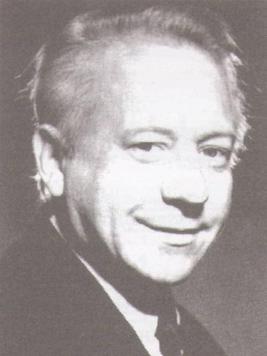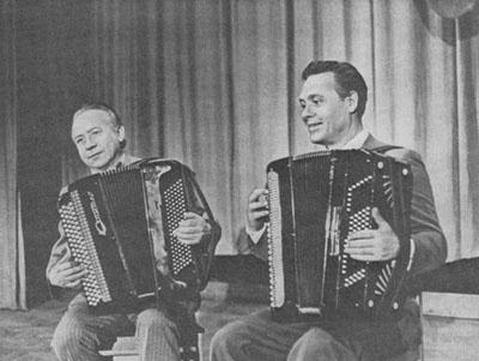Shalayev Anatoli Andreyevich (1925 - 1997)
|
Anatoli Shalayev, also written as Shalaev, was born December 26, 1925 in the village Semchury, Bryansk Region.
From 1934 till 1941 he studied piano ath the Central Music School of the conservatory of Moscow with the outstanding Russian pianist Goldenveiser. He also studied choral conducting with Ippolitova-Ivanov. Shalayev gave concerts since childhood and during the years 1941-1943, as concert accordeonist brigade he served hospitals and advanced the frontline. In 1943 he became accordeonist-singer in the Song and Dance Ensemble of the Moscow Air Defence, which he remained till 1950. In that year he became choirmaster and conductor of the ensemble. This job he would do till 1963. As he joined the Song and Dance Ensemble in 1943, Shalayev formed one of the best bayan duo's, with N. Krylov. The inimitable art of these two accordeonists was of very big importance to the development of the bayan as a popular instrument. For Shalayev this concert activity was an impulse to arrange a number of folk tunes, an unusal repertoire that still remains up to date. |
From 1961 till 1963 Shalayev formed a trio together with N. Krylov and B. Petrov.
Since 1963 Anatoli Shalayev was Honored Artist of the Russian Federation.
Most of Shalayev's works are used in the concert and teaching practice. They show a wide imagination, the desire to limit variations in a variety of textures, unusual methods of presentation. They impress by the desire of the author to bring an unusual tonal color in the bayan sound
Since 1963 Anatoli Shalayev was Honored Artist of the Russian Federation.
Most of Shalayev's works are used in the concert and teaching practice. They show a wide imagination, the desire to limit variations in a variety of textures, unusual methods of presentation. They impress by the desire of the author to bring an unusual tonal color in the bayan sound
|
Works
Thou winter, for two bayans I do not hear the noice of the city, for two bayans Thumbnails for bayan trio:
At the gate, the gate
Miniatures:
|
Fantasies on themes of revolutionary songs: Soldiers quadrille
Allegro de concert
Source: History of bayan and accordeon art, author Imhanitsky
Allegro de concert
Source: History of bayan and accordeon art, author Imhanitsky


